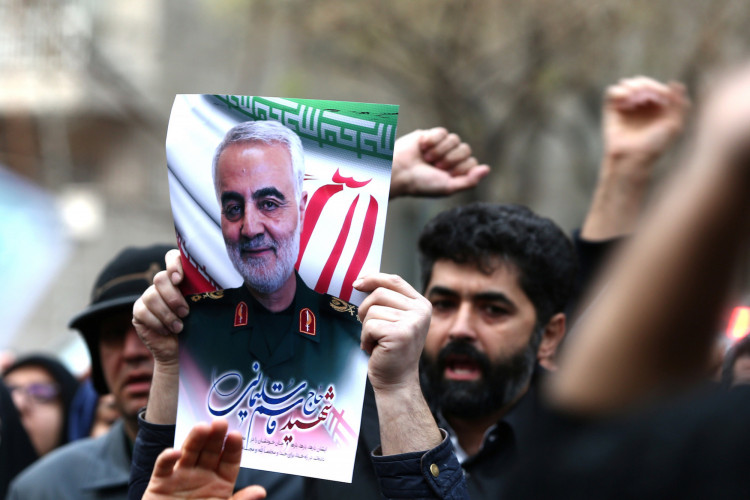President Donald Trump seems to have been so intent on killing Iranian major general Qasem Soleimani, he closed his eyes to other options that would have not led to the controversial assassination Iran now says triggered a state of war with the United States.
Soleimani, 62, was the second most powerful figure in Iran behind Supreme Leader Ayatollah Ali Khamenei. He was commander of the Quds Force, a combat division of the Islamic Revolutionary Guard Corps (IRGC) primarily responsible for extraterritorial military and clandestine operations. He was killed when two missiles fired by a U.S. Air Force aerial drone blew-up his car as it left the Baghdad International Airport on January 3. A ring he wore on his left hand identified his mangled remains. Iran has vowed to avenge Soleimani's murder with attacks on the U.S. military.
Media reports concur that Trump's advisers presented him with a range of options for responding to the attack on the U.S. Embassy in Baghdad last week. The most extreme of these options was killing Soleimani. Sources cited by media say Trump immediately wanted to target Soleimani and refused to listen to advice to the contrary from his national defense experts.
Doubts continue to persist as to the true reason why Trump ordered Soleimani's killing. The Department of Defense (DoD) said the assassination was carried out "at the direction of the President." It claimed Soleimani was killed because he was planning "imminent" attacks on American diplomats and military personnel. DoD also said Soleimani approved the attacks on the U.S. embassy in Baghdad in response to U.S. airstrikes in Iraq and Syria on Dec. 29, 2019. It said the assassination was meant to deter future Iranian attacks on Americans in the Middle East.
Trump said he ordered Soleimani's murder "to stop a war, not to start one." He said Soleimani's death means the latter's "reign of terror" is "over."
"The United States military executed a flawless precision strike that killed the number one terrorist anywhere in the world, Qassem Soleimani," said Trump on Friday at his Mar-a-Lago resort in Florida where he was vacationing at the time. "Soleimani was plotting imminent and sinister attacks on American diplomats and military personnel but we caught him in the act and terminated him."
On the other hand, Trump's critics claim Trump's real reason for ordering Soleimani's assassination was to draw attention away from the upcoming impeachment trial in the Senate set to begin this month. Democrats are questioning Trump's order to kill Soleimani, saying Trump hasn't clearly explained his reasoning for doing so.
Information revealed from Friday to Sunday cast doubt on the administration's claim Soleimani was murdered to pre-empt "imminent" attacks on Americans in the Middle East.
Asked by a reporter if the threat Trump claimed was "imminent," Chairman of the Joint Chiefs of Staff General Mark Milley on Friday said "absolutely," but defined the time frame as days and maybe weeks -- but not imminently as claimed by Trump.
Gen. Milley also warned the attacks said to have been planned by Soleimani might still take place. This means the threat to the U.S. wasn't eliminated by killing Soleimani. By saying this, Gen. Milley again contradicted Trump who said Soleimani's death had ended these threats, whatever it is they were.
A number of lawmakers have publicly said the information provided by the Trump administration in classified briefings last week gives an incomplete picture. This dearth of convincing information has led to more questions about whether the threats cited by Trump meet the legal standard of "imminent."
One Democratic source briefed Friday by administration officials told media the information offered was "absolutely unconvincing" as far as proving there was an imminent threat. Other Democratic lawmakers have raised similar concerns.
Sen. Tom Udall (D-NM) has again said he doesn't believe an attack on the United States was imminent as Trump and other top administration officials' claim.
"My staff was briefed by a number of people representing a variety of agencies in the United States government and they came away with no feeling that there was evidence of an imminent attack," said Udall
Udall believes Trump is only saying an attack was imminent to justify killing Soleimani.
Sen. Chris Van Hollen (D-MD) said one of his staff attended the Friday briefing. He said, "nothing that came out of the briefing changed my view that this was an unnecessary escalation of the situation in Iraq and Iran."
A DoD official when talking about this same topic responded by saying, "It all depends on what you call imminent." He said DoD believes Soleimani was in the "final stages" of ordering attacks when he visited






